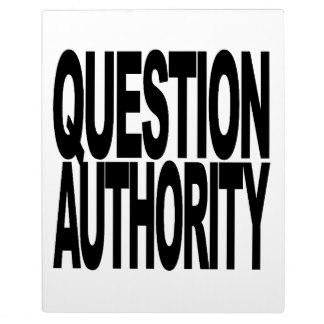Template:Question Authority
Question Authority

The slogan "Question Authority" has been around at last since the ancient Greek philosopher Socrates.
So let us question authority.
From where is the authority of government derived?
Does your father have authority over his son?
Does the Mother nursing you have the right to put you to bed and tell you to stay in your room?
Does your father whose house you live in and whose table you eat at have a right to tell you when to come home?
Can you terminate your parents right to tell you what to do and not do?
After all they gave you life, fed you sheltered you, changed your diaper for years. Just because you get a job and your own apartment can you just terminate all the natural or rightful authority of your parents?
The truth is if your natural father builds the house you live in, puts food on the table for you to eat, cloths on your back and protect you from all the things that might stop your life then he has a right to make choices for you. He earned it because your life is something he made, not something you made.
What if the state provides food, clothes, shelter, education, & health care for you?
Does the state now have some of the rights of the natural father?
The truth is almost all government authority is merely the right of the Conscripted fathers who sit in offices created by governments. In fact the power and authority of the State is mostly based on the Patrimonial right of kings and rulers who derived that authority from the natural fathers who produce society.
- Protection draws to it subjection, subjection, protection.
- Protectio trahit subjectionem, subjectio projectionem.
All this about substitute fathers and state as your father is why Jesus said "And call no [man] your father upon the earth: for one is your Father, which is in heaven." Matthew 23:9
So authority may be derived naturally from the offer of protection and provision.
This brings us back to the words of men like Plutarch[1] and Polybius who said "The masses continue with an appetite for benefits and the habit of receiving them by way of a rule of force and violence. The people, having grown accustomed to feed at the expense of others and to depend for their livelihood on the property of others... institute the rule of violence; [2] and now uniting their forces massacre, banish, and plunder,[3] until they degenerate again into perfect savages and find once more a master and monarch." [4]
We are warned about this appetite for benefits in Proverbs 23 if we sit to eat at the table or welfare system of rulers. It certainly tells us not to covet our neighbor's goods or anything that belongs to our neighbor. The Modern Christians ignore all that because he believes he has saved himself by what he thinks about Jesus.
It is these Covetous Practices that makes us Merchandise and gives authority to men to rule over us.
Footnotes
- ↑ “The real destroyers of the liberties of the people is he who spreads among them bounties, donations, and benefits.”
- ↑ Matthew 11:12 And from the days of John the Baptist until now the kingdom of heaven suffereth violence, and the violent take it by force.
- ↑ Luke 16:16 The law and the prophets [were] until John: since that time the kingdom of God is preached, and every man presseth into it.
- ↑ "But when a new generation arises and the democracy falls into the hands of the grandchildren of its founders, they have become so accustomed to freedom and equality that they no longer value them, and begin to aim at pre-eminence; and it is chiefly those of ample fortune who fall into this error. 6 So when they begin to lust for power and cannot attain it through themselves or their own good qualities, they ruin their estates, tempting and corrupting the people in every possible way. 7 And hence when by their foolish thirst for reputation they have created among the masses an appetite for gifts and the habit of receiving them, democracy in its turn is abolished and changes into a rule of force and violence. 8 For the people, having grown accustomed to feed at the expense of others and to depend for their livelihood on the property of others, as soon as they find a leader who is enterprising but is excluded from the houses of office by his penury, institute the rule of violence; 9 and now uniting their forces massacre, banish, and plunder, until they degenerate again into perfect savages and find once more a master and monarch" Polybius: The Histories (composed at Rome around 130 BC)Fragments of Book VI, p289